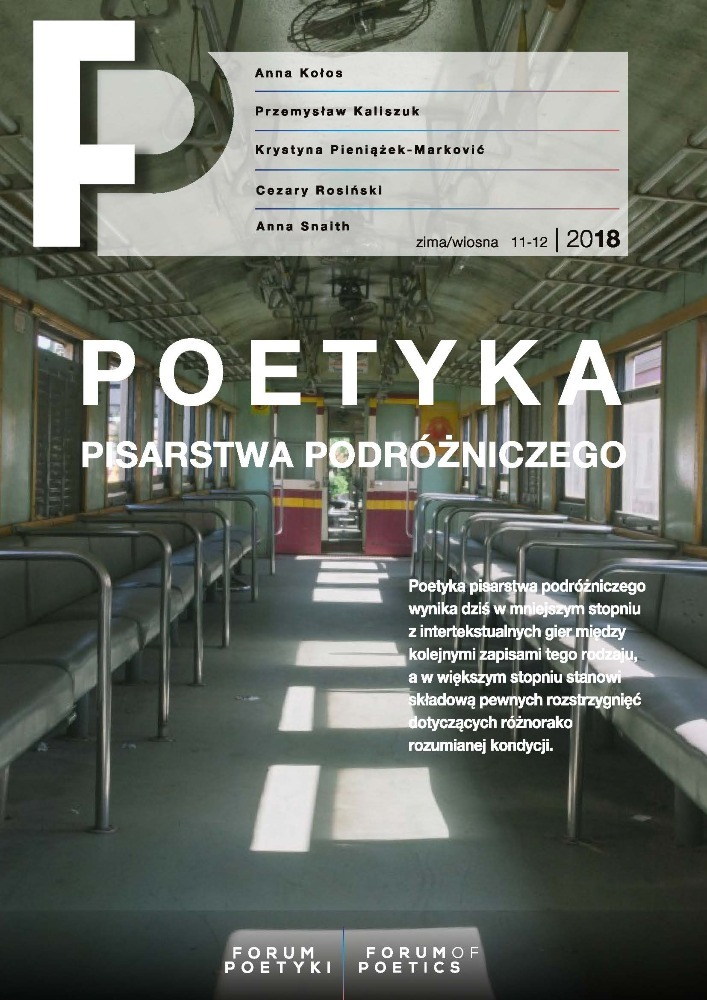No. 11-12 (2018)
In analyses that continue to dominate the field today, travel writing is framed as one of many possible textualizations of the places visited by their authors. These textualizations are suspended in rhetorical tension or conflict with other forms of textual rendering, and the agents behind them tend to retain the status of Roland Barthes’ historical “scriptors.” The growing relevance of travel writing as a subject for philological reflection seems to stem, however, from several other cognitive impulses. Among these, we can set apart the notion of “condition” as a problem of travel writing that we can understand in a number of ways. By confronting new places, the traveling subject takes stock of the personal, linguistic and cultural resources she has at her disposal. Together, these resources amount to a “condition” within our first understanding, as a form of inventory: rarely would these authors question the content (quality; volume) of their inventories before travel, and perhaps they never even knew it was possible to ask. To move on to our second understanding of condition, travel is almost always associated with a great (at times extreme) strain that forces the traveling subject to confront the limitations of her capacities and to ultimately develop a condition of her own: her ability to take care of herself, reckon with hardships, and concentrate on the very “here and now” of travel that ends up shaping the subject. This leads to our third understanding of condition, for the Latin conditio indicates not only an inventory and by analogy, a sense of lack, but the creative act as well. Today, the poetics of travel writing seem to rely less and less on intertextual play between a series of related narratives. More and more, they seem to consolidate certain conditional strategies. They can offer a method for taking stock of collective balances and individual inventories, or for identifying fundamental deficiencies, limitations, impossibilities and impasses. Finally, they allude to, or perhaps replicate, the work of developing new conditional possibilities and the formation of new skills, new forms of attention and focus, and new techniques of preservation. This final and unusually pragmatic aspect shifts the emphasis from the intertextual relationship to the relationship between text and gesture, text and worldview, or perhaps text and the creative act under strictly circumscribed conditions.
In this issue of “Forum of Poetics”, we map out, for example, the conditional dilemmas of historical European authors chronicling their encounters with China (Anna Kołos, Tomasz Ewertowski). Briefly taking stock of the Western inventory, we do not always turn up encouraging results. We also see how travel was at times linked to such a vulnerable sense of one’s “condition” that travelers were compelled to develop a mythology around an imagined inventory (Krystyna Pieniążek-Marković’s article speaks to this issue in the context of travel texts by Croatian romantics). At other times, travel leads to a complex game with the forces of colonial domination (Anna Snaith describes such a process in her important article on women’s travels in London, translated for this issue). In an analogous scenario, a forgotten Polish interwar reporter denounces allegiance to colonial mythologies, exposing the cruelty of white colonists in the Congo (Mikołaj Paczkowski’s article on Tadeusz Dębicki). Using the correspondence of late romantics, Anna Marta Dworak explores the development of skills necessary for coping with the conditions of a new form of travel: the train. Przemysław Kaliszuk describes portrayals of the conditions needed for travel in his analysis of the poetics of books by two renowned Polish climbers who took on the Himalayas, Jerzy Kukuczka and Adam Bielecki. We also encounter the special gonzo state of the contemporary, individualized traveling subject; through his extraordinary conditions, he is able to forge a radically new method for recording his encounters with the space. Arkadiusz Kalin and Cezary Rosiński discuss these themes using the case study of reportage by Ziemowit Szczerek. Urszula Kowalska-Nadolna and Wiesław Ratajczak’s reviews of books by Robert Burden and Agnieszka Adamowicz-Pośpiech complement these reflections. The reviews meticulously discuss travel accounts as symptoms of the “condition of crisis” of modern subjectivity. Themes of condition are approached from yet another angle (this time outside the domain of travel) in two polemics by Grzegorz Pertek and Patryk Szaj, who explore motifs of the contemporary conditions of deconstruction and hermeneutics.
We might therefore posit that today, poetological travel writing requires new “conditional” strategies, and that the poetics of the analyzed text participate in developing these strategies more or less directly.
